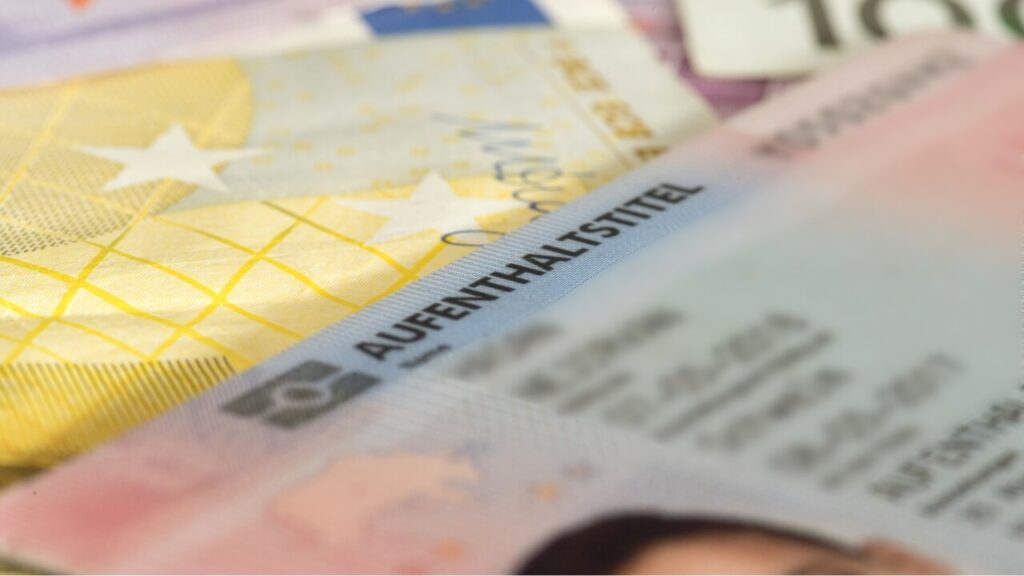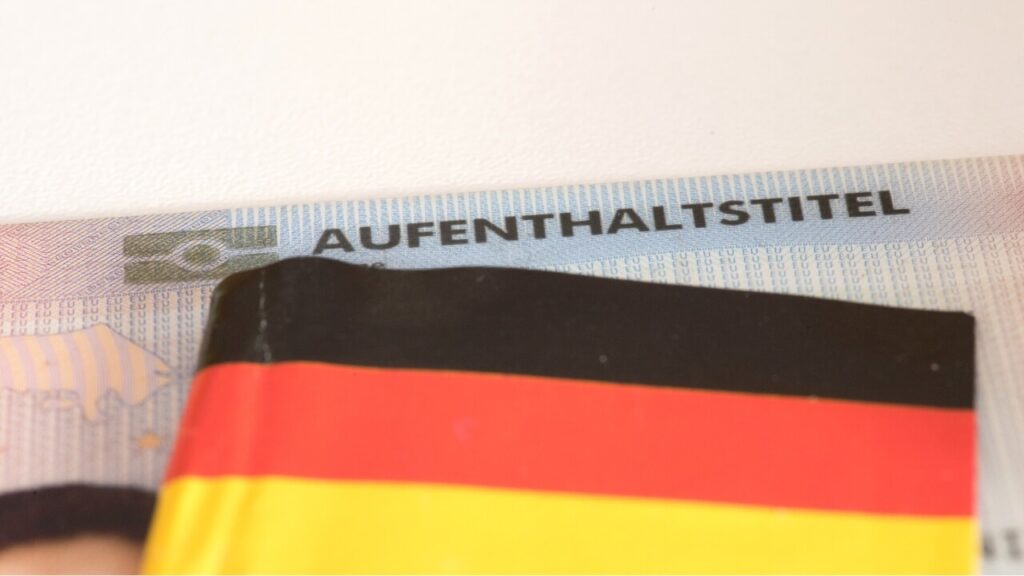The BlueCard in Germany is a very popular topic among the international professionals. If you’ve ever considered expanding your horizons and working in Germany, understanding the ‘EU Blue Card’ process becomes essential.
In this step-by-step guide, we will let you know the requirements, salaries, and other formalities to have your EU BlueCard for Germany.
So, without wasting time let’s talk about today’s topic: ‘BlueCard in Germany’. We hope you will be well informed about Blue Card if you read this post till the end.
What is the BlueCard in Germany?
The EU Blue Card is a special type of residence permit. Its purpose is to make it easier for highly qualified people from outside the EU to move to Germany and other European countries permanently.

This project was launched as a unique initiative. The Blue Card offers a streamlined method for non-EU nationals to live and work in Germany and other EU countries.
The vision of the EU Blue Card
The vision of the EU Blue Card is to allow people from non-EU countries with a degree and a job offer with a minimum income (we will discuss that soon) to live and work in EU countries like Germany, Finland, France, Austria, Belgium, Italy, Poland etc. It encourages skilled workers to come, especially in jobs where there’s a shortage.
Additionally, its goal is to help skilled migrants to become permanent residents in the EU quickly. Also makes it easier for their families to join them as well.
Comparison with EU Blue Card and other visa options
While many visa options exist, the Blue Card differentiates itself by prioritizing highly skilled professionals, ensuring a smooth transition into Germany’s vibrant workforce. The EU Blue Card offers skilled workers an opportunity to work and reside in European Union member states.
In contrast, the Schengen Visa is a short-term travel permit, limiting stay duration. The student visa is tailored for international students pursuing education. On the other hand, a family reunification visa allows family members to join EU residents. Though students can invite their spouses in most cases, they need a blocked account. Because often the students can’t afford family expenses by doing a part-time job.
Additionally, the entrepreneur visa targets individuals starting businesses. Compared to these options, the EU Blue Card offers long-term employment prospects and a path to permanent residency, making it a preferred choice for professionals seeking stability in the EU.]
Eligibility & requirements of EU Blue Card
There are two main requirements for the EU Blue Card in Germany. Firstly, a recognized degree. Secondly, Minimum salary. Other than these two requirements there are some requirements as well to be eligible for the Blue Card. These are as below:
- Academic qualifications
- Recognized degrees in Germany
- Professional qualifications
- Minimum salary threshold
- Language skills
We will explain them now a little bit more. If you want to get an EU Blue Card for Germany, you must fulfill these requirements.
Academic qualifications
Firstly, you have to have some academic qualifications to obtain an EU Blue Card. You must be a graduate. Our research found, in most cases, the educational qualification is at least 16 years of education.
Recognized degrees in Germany
If you want to come to Germany with a Blue Card your degrees should be recognized by German authorities such as ANABIN.

Professional qualifications
For a German Blue Card, you must have work experience. In most cases, you need at least 5 years of work experience. But keep in mind, in other EU countries, you can get a Blue Card even without any degree. Not only that, some countries even ask for 5 years of work experience. Unfortunately, this does not work in Germany. So you must have a university degree and that one should be recognized in Germany.
Minimum salary threshold
Lastly, the most important prerequisite is the minimum salary threshold. You have to have a concrete job offer in Germany or a valid employment contract. As of 2023, your minimum gross salary should be €58,400 or €45,552 in STEM professions per year. Similarly, you can think per month your salary should be around €4,866 to €3,796 before tax.
Language requirements
Though not always mandatory, a working knowledge of German can considerably boost your chances of success. Certain professions might require official language certifications, while others might offer exemptions based on your educational background.
Other requirements
There are some other requirements such as certain professions, like health, law, teaching and engineering are regulated. So in addition to presenting your academic degree, you must also have recognized that from the special authorities in Germany.
Benefits of obtaining a Blue Card
There are lots of benefits of obtaining a Blue Card in Germany. Aside from providing a clear path to employment, the Blue Card also paves the way for permanent residency. Not only that, but the Blue Card also ensures comprehensive social benefits when you enter into the social security system in Germany. It also ensures a higher standard of living in Germany. Blue Card holders’ family members can enjoy these benefits too.
So, what other benefits are there for a Blue Card holder in Germany? Let them explain below:
A Blue Card is better than a Work Visa
As we mentioned earlier, you need a university degree to be able to have a Blue Card in Germany. It’s the same for Work Visa as well. But the Blue Card is better than a work visa. Since Blue Card has other positive aspects.
Blue Card is faster
If you are thinking of having a Work Visa in Germany you might need to wait long because of the bureaucratic process. But the Blue Card in Germany is a kind of straightforward process. Normally, you don’t need any permission from the ZAV (Zentrale Auslands- und Fachvermittlung) if your salary is over €58,400 per year. This will make the application simpler and faster.
PR is faster with BlueCard in Germany!
You can get your PR or permanent residency in Germany if you have a Blue Card. As of now, you need to wait 60 months to have a PR in Germany. But if you have a BlueCard then you are lucky enough! You can get your permanent residency in just 33 months! Even faster is also possible! If you have a German language B1 certificate, you can get your PR within 21 months!
Europe is yours! Move anywhere!!
If you have a Blue Card, Europe is yours. Generally, it’s easier to move to other EU countries with your Blue Card. When your Blue Card is over 18 months olderx, then you can move to another EU country. Also, you can apply for the Blue Card to your new destination country. Except for Denmark and Ireland Blue Card enables you to move to any other EU countries very easily.
Longer stay outside of Germany
Homesickness is normal. And you may want to stay outside Germany with your BlueCard. You can do that! You can leave Germany for 12 months with your Blue Card. Your residency in Germany won’t be invalid!
But with a general Work Visa, you can’t stay outside of Germany for so long! You can only leave Germany for 6 months if you have a Work Visa. But if you want to leave Germany for longer than an accepted period of time, you can apply for special permission from the foreign office (Ausländerbehörde) in Germany, in both cases.

Changing a job is easier with Blue Card
With a Blue Card, you can switch jobs after 2 years without needing a new Blue Card. This is much quicker than a work visa, where you have to apply for a new visa every time you change jobs.
Application Process for BlueCard in Germany
In this section, we will let you know the Application Process for BlueCard in Germany. Generally, getting a BlueCard is a very straightforward process. Below, we are going to explain them:
Step 1: Finding a job in Germany
To obtain a BlueCard in Germany you should look for a job in Germany that covers the minimum requirements of salary.
Step 2: Gathering necessary documents
When you get a job then ensure all your documents, including academic transcripts, work experience letters, language certificates (if you have any) etc are in order.
Step 3: Preparing for the visa
After getting the job and gathering all the documents you should take preparation for your visa. Firstly, you have to make an appointment for the visa in your home country. As of today, you have to pay €75 for the visa fee.
Step 4: Enter to Germany
After applying for a visa, you should get an entry visa to Germany for three to six months. Now it’s time to buy a plane ticket to fly to Germany.
Step 5: Apply for the EU Blue Card in Germany
The last step is to apply for the EU Blue Card. For that, you need to contact your local foreign office (Ausländerbehörde) in Germany. You have to bring all the related documents you have. For the BlueCard you need to pay €110. By the way, you have to keep in mind that the EU Blue Card must be applied for
before your entry visa expires.
Family reunification with the BlueCard in Germany
Family reunification with the Blue Card in Germany is subject to certain rules and requirements. But don’t worry! It is not hard to bring your family members if you are a Blue Card holder! As we mentioned earlier, the Blue Card is a special kind of residence permit for highly skilled non-EU citizens who wish to work and live in Germany. If you are a Blue Card holder in Germany and want to reunite with your family, here are the key points you should know:
Eligibility: To be eligible for family reunification with a Blue Card in Germany, you must meet the following criteria:
- You hold a valid Blue Card
- You have secured suitable accommodation for your family
- You have sufficient financial means to support your family members
Family members: The following family members are eligible for reunification with a Blue Card holder:
- Spouse: Your legally married spouse
- Children: Your unmarried and dependent children who are under 18 years old
- Dependent children over 18: In some cases, dependent children over 18 years old may also be eligible if they are unable to support themselves due to a physical or mental disability
Application process:
- You, as the Blue Card holder, must apply for family reunification on behalf of your family members at the local immigration authority (Ausländerbehörde).
- Your family members will need to submit a visa application at the German embassy or consulate in their home country.
Other requirements for family reunification with the BlueCard in Germany
There are some other small requirements that you should keep in mind before you apply for family reunification. These are:
Financial requirements: You must demonstrate that you have enough financial means to support your family without relying on social assistance. The exact amount required may vary depending on your family size and the local regulations.
Suitable accommodation: You must provide evidence that you have suitable accommodation for your family members in Germany. This typically means having a residence that meets local standards for habitability.
Language proficiency: While not a strict requirement, it can be beneficial for your family members to have basic knowledge of the German language to facilitate integration.
Processing time: The processing time for family reunification applications can vary depending on the local immigration office and the specific circumstances. It’s advisable to start the process well in advance.
Residence permit for family members: Once approved, your family members will receive a residence permit that allows them to live and work in Germany. The validity of this permit is typically tied to the duration of your Blue Card.
Job search tips for BlueCard in Germany
Searching for a job to achieve a Blue Card in Germany can be a rewarding experience, as it allows you to work and live in one of Europe’s economic powerhouses. Here are some tips to help you in your job search:
- Understand the Blue Card: Make sure you understand the requirements of the Blue Card.
- Update your CV: Tailor your CV or resume to the German job market. Highlight your skills, qualifications, and work experience that make you a valuable candidate for the specific positions you are interested in.
- Learn German: Though many multinational companies in Germany use English as their working language, having a good command of German can significantly increase your job prospects.
- Networking: Networking is important in Germany. While you are in Germany try to attend industry events, seminars and workshops. Join professional networks and groups both online and offline. LinkedIn is a valuable platform for connecting with professionals in your field.
- Online job portals: Utilize online job portals such as Degreeola Job Search Engine, LinkedIn, Xing, Indeed, StepStone, Monster etc. These platforms allow you to search for job openings and connect with potential employers. But many companies in Germany prefer to advertise job openings on their own websites. So keep an eye on them too.
- Apply for jobs early: The application process in Germany can be lengthy. That’s why start applying for jobs well in advance.
- Prepare for interviews: When you get an interview, prepare thoroughly. Research the company, practice your interview answers and be ready to discuss your qualifications and how they fit the role.
Once you secure a job, make sure to follow the necessary steps to obtain and maintain your Blue Card.
Salary and taxes of BlueCard in Germany
When it comes to the salary and taxes of the BlueCard in Germany, it’s hard to say anything very straightforward. There are six types of tax classes (Steuerklassen) in Germany. And these depend on your marital status, age, income level etc. Also, how much tax you have to pay depends on which tax class you have.
The BlueCard holders are subject to German income tax and their salary level plays a key role. Progressive tax rates apply, ranging from 0% to 43%. However, there are tax deductions and allowances available, which can help optimize your tax liability. Since you will be new in Germany, it’s better to consult with tax professionals if you need any help.
BlueCard in Germany-related FAQs
Which countries give Blue Card in Europe?
You can apply for an EU Blue Card in all EU Member States except Denmark, Ireland and the United Kingdom (UK). But, there are differences among these countries when it comes to the requirements, like the minimum annual salary.
At the moment these EU countries have committed to issuing the EU Blue Card: Austria, Belgium, Bulgaria, Croatia, Cyprus, Czech Republic, Estonia, Finland, France, Germany, Greece, Hungary, Italy, Latvia, Lithuania, Luxembourg, Malta, Netherlands, Poland, Portugal, Romania, Slovakia, Slovenia, Spain and Sweden.
What is a BlueCard in Germany? Who is eligible for it?
The EU Blue Card is a special type of residence permit for highly skilled professionals who wish to work in an EU Member State. To obtain an EU Blue Card, applicants are required to have a university degree and a work contract that meets the yearly minimum gross salary requirement.
Generally, the EU Blue Card (Blaue Karte EU) offers the same rights to work as the German Work Visa. One of the most attractive points of the EU Blue Card is the ability to travel freely within the EU. An easy option to relocate family members and spouses.
How do I get a Blue Card in Germany?
Getting a Blue Card for Germany involves a few steps. Firstly, you have to find a job that meets the minimum salary threshold. Secondly, you have to apply for a German employment visa and go to Germany. Thirdly, after coming to Germany, needs to do city registration (Anmeldung), make health insurance and collect other related documents from the jobgiver. Finally, apply for a Blue Card at the foreign office (Ausländerbehörde).
What is the salary for Blue Card in Germany?
To be eligible for the EU Blue Card, the gross annual salary for most positions should be at least €58,400. But specific fields like mathematics, IT, natural sciences, engineering and human medicine require a gross annual salary of at least €45,552. Please note that these figures are subject to change. So it’s important to verify the current requirements from official sources before applying for the EU Blue Card.
Conclusion
Finally, we would like to say that if you maintain the step-by-step guide to achieving the BlueCard in Germany, it’s not hard at all. You have to follow the instructions above what we already mentioned.
Try to find a job that matches the minimum salary threshold to get an EU Blue Card and come to Germany. If you have questions about BlueCard in Germany, just let us know by commenting below.
And if you find this blog post useful then please share it on Facebook, so that your friends also get benefits from it. Thanks again! See you in Germany!

I am a diploma electrical engineer